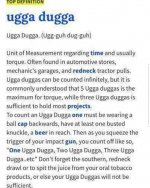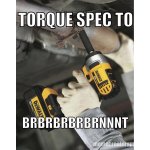RSQCON
Member
I just got back from running the Rubicon and Fordyce and we had a couple small things that needed to be addressed. One of my good buddies is a 'good and tight' kind of guy when it comes to stuff but that's just not my style. My OCDness requires me to know actual torque values when it comes to tightening bolts so I'd like to start a thread and start compiling data. Understandably it won't be universal but hopefully I can help and others can pitch in on stuff I'm looking for. Here is what I have so far...
Axle shaft flange bolt (rear) Dynatrac 65 ft lb Red
Ball joint nut (lower) Dynatrac 140 ft lb None
Ball joint nut (upper) Dynatrac 85 ft lb None
Beadlock ring bolts KMC 20-24 ft lb None
Belt tensioner Mopar 24 ft lb N/A
Caliper bolt (front) Dynatrac 150 ft lb Red
Caliper bolt (rear) Dynatrac 110 ft lb Red
Diff cover bolts (front) Dynatrac 25 ft lb Red
Diff cover bolts (rear) Dynatrac 35 ft lb Red
Pinion nut (front/rear) Dynatrac 250 ft lb Red
Steering arm Dynatrac 105 ft lb Red
Tie rod castle nut 63 ft lb None
Tie rod/Drag link clamps Dynatrac 35-45 ft lb Blue
Transfer case yoke (front/rear) Adams 160 ft lb ” Red
Transfer case flange bolts Adams No Value Red
Winch mount bolts Warn 30-35 ft lb Blue
Some of the numbers I am looking to add...I know Evo has a torque chart at the end of their instructions but for example my arms have a clamping bolt and then a jam nut. if you go based off their chart the bolt is something like 30 ft lb which seems way low and the jam nut isn't addresses.
Dynatrac Pro Rock 60 9/16" lug nuts
Evo Double D Long arms
Evo bolt on coilovers
Axle shaft flange bolt (rear) Dynatrac 65 ft lb Red
Ball joint nut (lower) Dynatrac 140 ft lb None
Ball joint nut (upper) Dynatrac 85 ft lb None
Beadlock ring bolts KMC 20-24 ft lb None
Belt tensioner Mopar 24 ft lb N/A
Caliper bolt (front) Dynatrac 150 ft lb Red
Caliper bolt (rear) Dynatrac 110 ft lb Red
Diff cover bolts (front) Dynatrac 25 ft lb Red
Diff cover bolts (rear) Dynatrac 35 ft lb Red
Pinion nut (front/rear) Dynatrac 250 ft lb Red
Steering arm Dynatrac 105 ft lb Red
Tie rod castle nut 63 ft lb None
Tie rod/Drag link clamps Dynatrac 35-45 ft lb Blue
Transfer case yoke (front/rear) Adams 160 ft lb ” Red
Transfer case flange bolts Adams No Value Red
Winch mount bolts Warn 30-35 ft lb Blue
Some of the numbers I am looking to add...I know Evo has a torque chart at the end of their instructions but for example my arms have a clamping bolt and then a jam nut. if you go based off their chart the bolt is something like 30 ft lb which seems way low and the jam nut isn't addresses.
Dynatrac Pro Rock 60 9/16" lug nuts
Evo Double D Long arms
Evo bolt on coilovers


